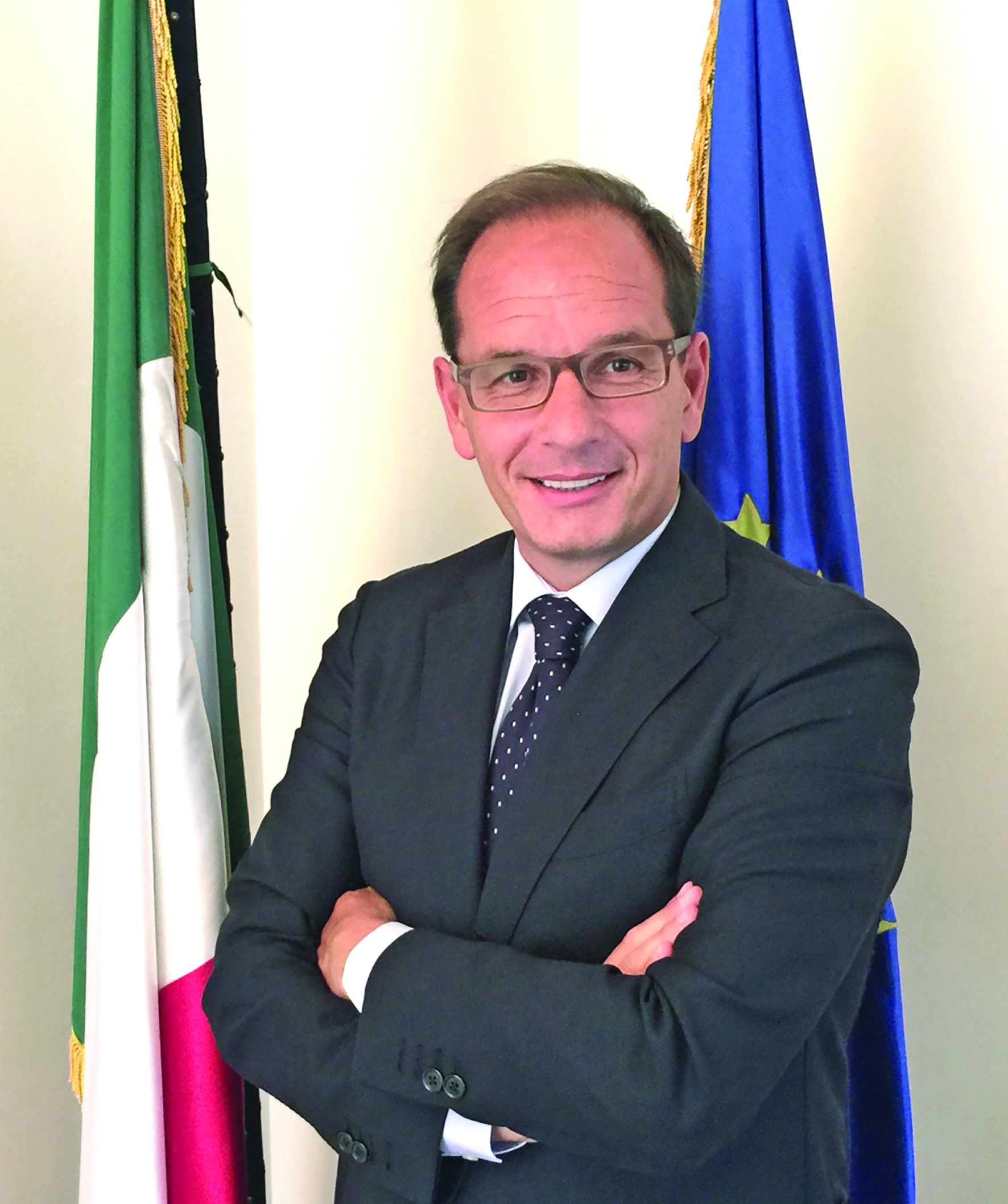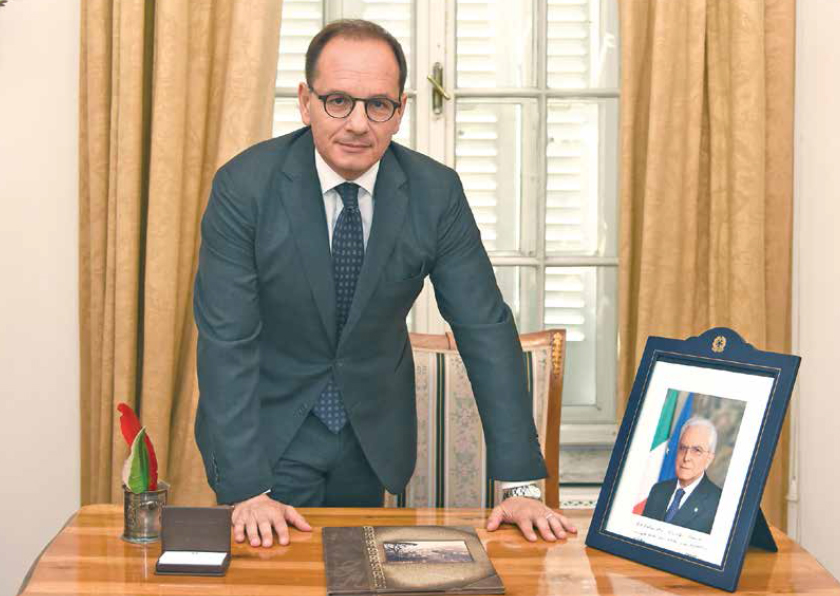The future of the EU and the Western Balkans is “zajedno” (together), as we are linked by a project of common interest. Italy is the engine and a fundamental part of that project, but Serbia and the other Balkan countries, with new energies, can also contribute to an even more prosperous, safer and stronger Union.
We spoke with H.E. Giuseppe Manzo, Italian Ambassador to Serbia, about the progress achieved by Serbia in the EU accession process and the implementation of economic reforms, as well as Italian support for these processes.

How much has Serbia changed over the last four years?
― Compared to four years ago, today Serbia is a European Union Membership Candidate that has started accession negotiations, has opened some of the negotiation chapters and has, even with all the difficulties and slowdowns, achieved some important results in fulfilling commitments under the agreement on the Belgrade-Priština dialogue. Along these two extremely important paths of dialogue and integration, I have witnessed moments of change that have been marked by unprecedented events and initiatives. In the area of freedom of expression and the protection of minorities, I refer to the first Pride Parade in Belgrade to be held peacefully. And regarding the normalization of relations with Priština I am thinking of the first time a Foreign Minister of Kosovo visited Belgrade to participate in a Western Balkans 6 summit. And then, speaking of what has changed, there are certainly very positive economic statistics, showing discipline in public expenditure, with numbers now looking much better and enabling a focus on the priority of growth. All three of these “tracks” – the strengthening of fundamental democratic principles (the rule of law), regional dialogue and economic recovery – are closely interlinked.

In which areas has Italy provided the most support to Serbia in the EU accession process?
― It has done so on all three of the tracks that I just mentioned. When it comes to the EU integration process, we have supported the progress of accession negotiations in Brussels, while here in Belgrade we assist various Serbian administrations in the most important areas of this process and in those closer to the needs of citizens: reform and improvement of the anti-corruption system, defining the national counter-terrorism strategy, strengthening capacities to fight mafia groups and organised crime, but also on the improvement of the quality of land products and determining the true value of the artistic and cultural heritage of Serbia for economic purposes. As regards the stabilisation and regional integration of the Western Balkans, we work both on the political front, for example with the trilateral initiative started by our Foreign Minister, who leads it with his Serbian and Albanian counterparts, and the economic front, for example by supporting new forms of business collaboration between all of the Western Balkans Six, which will be in Italy on 12th July for the Trieste Summit. And, finally, when it comes to economic growth and development, Italy is the leading foreign investor in Serbia in the 2000-2016 period and Belgrade’s second biggest trading partner.
How do you see the future of the EU and the Western Balkans?
―”Zajedno”, to answer as my Serbian friends would say. Our future belongs together, by virtue of us being linked by the project of common interest. That project, born in Rome, which celebrated its 60th anniversary this year, on 25th March, laid the foundations for a community of peoples and nations that had been waging war against each other just a decade before. That community – in which peace, freedom, democracy and fundamental rights are guaranteed – is the European Union, and that project is still underway, because it will not be completed until it includes all the Balkan countries. Today we need to relaunch the European integration project precisely at one of the most difficult junctures in our common history, where we need to respond with greater efficiency to the demand for security, employment and the hope that comes from our citizens. Italy is the engine and a fundamental part of this project, but Serbia and the other Balkan countries, with new energies, can also contribute to an even more prosperous, saferand stronger Union.
The next Summit of the Western Balkans is scheduled to take place in Trieste this July. What are your expectations from that meeting?
― First of all, I would like to emphasise that the very choice of the city of Trieste as the venue for the forthcoming Summit of the Western Balkan countries is an acknowledgment of the central role that this region plays. On 12th July in Trieste, Italy, the intention is to send a clear message of concrete support for cooperation between the countries of this region, with a view to their accession to the European Union. We will do this by gathering in Trieste not only government representatives, but also entrepreneurs, youth organisations and civil society representatives from the region and other EU countries that, like Italy, pay attention and are close to the needs of the citizens of this area. Regional economic integration, transport and energy interconnections, youth cooperation and the promotion of the rule of law will be the key issues at the centre of the agenda in Trieste.
How do you assess the impact of political instability in the region, and the role of Serbia in preserving peace and progress in the region?
― History is life’s teacher, and here in the Balkans it tells us that stability is an asset to be preserved with all our power, and that the instability of neighbouring countries soon becomes our own. Stability and cooperation in the region are simultaneously a premise and an indispensable goal for anyone wishing to accompany this part of Europe to a sustainable path of economic and social growth, considering the ultimate goal of the integration of the Balkans into the EU. From this perspective, Serbia demonstrates its ability to play a crucial role in contributing responsibly and constructively to maintaining peace and stability in the region. Italy and Belgrade’s other major international partners greatly appreciate Serbia’s commitment to the stability of the Balkans and encourage Serbia to continue in its commitment.
Serbia has a new president and is to receive a new prime minister. What are your expectations when it comes to the general course of the country?
― The outcome of the previous presidential elections has clearly confirmed the pro-European choice that Serbia’s current political leadership has set as the country’s strategic goal. The expectation – which I think is shared by all citizens – is that the message coming from the people will encourage Serbian political institutions, the Government and the Parliament to continue, with renewed commitment and determination, with the reforms envisaged within the framework of EU accession negotiations. It is equally important to emphasise that the accession negotiations are not merely the end of a process that Brussels imposes as a condition for joining the EU, but rather they are the most useful tool for reforming the country within itself, which is in the interests of all citizens, who are the direct beneficiaries. We expect this process to continue with even greaterdetermination and effectiveness now,for the well-being of citizens.
How do you assess bilateral relations between our two countries?
― Relations between Italy and Serbia are really excellent, and even if it seems that all areas of cooperation are almost fully utilised with the intense network of existing initiatives, we are always looking for new areas to explore opportunities to expand and deepen our Strategic Partnership. Italian Minister of Foreign Affairs Angelino Alfano was in Belgrade to confirm Italy’s strong interest in further developing our bilateral relations, starting from the two pillars that support them: economy and security. On the first point, my country’s system of economic diplomacy will continue not only assisting the Italian companies already present here, but also working on bringing new investments, also by using the opportunities offered by European funding. On this very issue, the Embassy of Italy recently developed a quick guide for Italian entrepreneurs interested in investing in Serbia. In recent weeks bilateral cooperation has opened a new extremely important area: the valorisation of artistic and cultural heritage for economic purposes as well.
Italy used to hold the first place in Serbian import and export, but today Germany is becoming number one. Where do you see the opportunities for further growth of our cooperation?
― Italy and Serbia have commercial trade that in 2016 grew to €3.7 billion, thanks to the over 600 Italian companies that are present here, employing more than 26,000 workers. Italian investments in Serbia are a visible and tangible presence in the automotive, banking, insurance, agribusiness and clothing sectors. It is not a zero-sum game. In the logic of economic growth, integration and the European path that I have explained before, further investments and the more active role of other European partners are very positive, precisely because they promote the stability and socio-economic development of a country (and a region) that has been a priority for Italy for a long time, and in which we have been investing, both politically and economically, for many years. It is positive that new partners are coming.